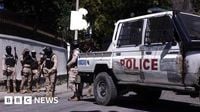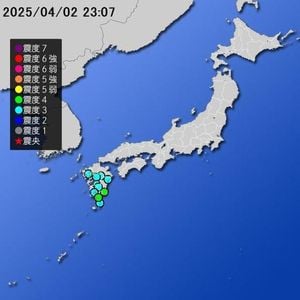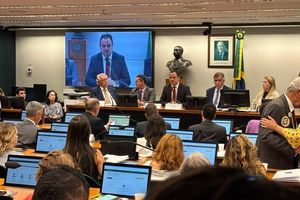In a shocking escalation of violence, gang members in Haiti stormed the town of Mirebalais on March 31, 2025, freeing over 500 inmates from a local prison. This brazen attack underscores the deteriorating security situation in the country, where armed gangs have increasingly targeted both urban and rural areas.
The assault began late on March 30, when members of the Viv Ansanm gang coalition attacked the prison, which housed 516 inmates. According to Marie Yolene Gilles, head of the human rights group Fondasyon Je Klere, only 65 of these inmates had been sentenced, while the rest were in pre-trial detention, including 27 women, 410 men, and 14 juveniles. As the gangs set fire to a nearby police substation and launched gunfire at buildings and passers-by, panic spread through the streets of Mirebalais, sending residents fleeing for their lives.
Local police initially reported regaining control of the town, located about 50 kilometers northeast of Port-au-Prince, but many escaped inmates remained unaccounted for. The attack was carried out by two notorious gangs, the 400 Mawozo and a group known as "Taliban," both of which are part of the Viv Ansanm coalition that controls northern parts of Port-au-Prince. The 400 Mawozo is infamous for kidnapping, while the Taliban gang operates from its stronghold in Canaan, a suburb of the capital.
This incident follows a broader trend of escalating gang violence in Haiti. According to United Nations figures, more than 5,600 people were killed in Haiti last year due to gang-related violence, with a further 2,212 injured and 1,494 kidnapped. The situation has only worsened since the arrival of Kenyan police officers as part of a UN-backed Multinational Security Support (MSS) mission aimed at restoring order in the country.
Since the Kenyan police arrived, over 4,000 people have been killed in gang-related incidents, with the UN estimating that between July 1, 2024, and February 28, 2025, at least 4,329 deaths were linked to gang violence. The report indicates that men accounted for 3,491 of those killed, while 601 women, 94 boys, and 53 girls also lost their lives. Additionally, 1,356 individuals were injured during this period, with men again comprising the majority of those harmed.
In the wake of these alarming statistics, the UN Office of the High Commissioner for Human Rights reported that 92 percent of the deaths and injuries were caused by firearms. This alarming trend is exacerbated by the fact that Haiti does not manufacture weapons, yet illegal firearms are estimated to number between 270,000 and 500,000 in the country, predominantly in the hands of criminals and private security firms.
As the violence escalates, the MSS mission, which includes police and military officers from Jamaica, Belize, the Bahamas, Guatemala, El Salvador, and Haiti, has struggled to regain control over gang-dominated areas. The situation took a tragic turn when Kenyan police officer Benedict Kabiru was killed in a gang ambush just days before the Mirebalais incident. He was the second Kenyan officer to die in Haiti since the MSS began its operations.
Local officials have criticized the lack of preparedness and response from security forces. Frédérique Occéan, a presidential appointee for the region, stated that local leaders had been requesting armored vehicles to reinforce the police but had received none. He remarked, “We have a lot of political will to fight, but we need the means to fight.”
Gilles expressed frustration at the repeated pattern of gang violence, noting that armed groups often announce their attacks in advance, yet there is little to no resistance from law enforcement. She questioned, “Why didn’t [the police] take steps to counter the attacks against Mirebalais? Because everyone knew.”
The attack on the Mirebalais prison is reminiscent of similar incidents last year when gangs stormed Haiti’s two largest prisons, freeing over 4,000 inmates, including gang members. This ongoing violence has led to significant displacement, with over 60,000 people fleeing their homes in just the past month as they seek safety from the escalating violence.
In addition to the immediate threat posed by the gangs, the UN report highlights the broader implications of this violence, which has severely impacted human rights and humanitarian conditions in Haiti. The gangs have not only engaged in killings but have also ramped up kidnappings, sexual exploitation, and destruction of property.
As the situation deteriorates, the UN has raised concerns about air travel in Haiti, particularly in gang-controlled areas. Last year, gangs shot down three commercial planes, leading to a temporary suspension of all flights until February 2025. The attacks occurred shortly after the dismissal of former interim Prime Minister Gary Conille, although the links between the two events remain unclear.
The violence has also targeted informants and individuals believed to be assisting the MSS and Haitian authorities in their efforts to combat gang activity. The gangs have expanded their control into middle-class neighborhoods, notably Solino, using these areas as strategic footholds to access wealthier regions.
In conclusion, the recent events in Mirebalais highlight the urgent need for effective intervention and support to address the rampant gang violence in Haiti. With the international community's assistance, there is hope for restoring order and ensuring the safety of the Haitian people, but immediate action is crucial as the violence continues to spiral out of control.




